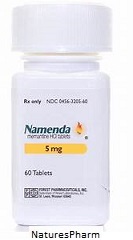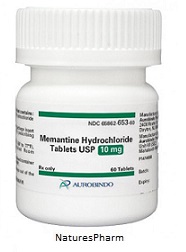What is Namenda?
Namenda is a medication taken by patients to treat severe and moderate confusion or dementia connected with Alzheimer’s disease. However, its use can’t cure this condition, because it works by improving people’s awareness, memory and their ability to do their daily things. This medicine blocks the action of glutamate in the brain, and this natural substance is related to the signs of this disease.
Namenda should be taken orally with and without meals and based on the directions given by doctors. The right dosage is prescribed based on individual response and medical condition. When using it for the first time, take this medicine only once a day. To avoid possible risk of experiencing unwanted side effects, most doctors direct their patients to start this treatment at lower doses that can be gradually increased. Once a dose is 5 mg, Namenda should be taken twice a day, and use this medication regularly to get its full benefit. Take each dosage at the same time on a daily basis and inform doctors if your condition gets worse.
Before starting this treatment, visit doctors to be properly examined. They need to know everything about your medical history, especially if you have any possible allergic reactions and such serious conditions as kidney problems, recent diet changes, serious urinary tract infections, etc. The intake of Namenda can make patients dizzy, so they shouldn’t drive or do other things that require them to be fully alert. Besides, all alcoholic beverages should be limited, to be on a safe side. Before undergoing any surgery, ensure that dentists and doctors know about the use of this medicine.
Other meds should be avoided, because drug interactions often change the way pharmaceuticals work and increase a possible risk of serious adverse effects. Some of the most common remedies that potentially interact with Namenda include carbonic anhydrase inhibitors, like methazolamide and acetazolamide. For example, any medications that make people’s urine more alkaline are expected to decrease the elimination of this drug by kidneys, thus, increasing the risk of side effects. It’s not allowed to combine it with other NMDA receptor antagonists for the same reason. That’s why patients need to make and keep a full list of other drugs they’re using, including prescription and over-the-counter pills, supplements, vitamins and minerals.
Like many other medications, Namenda is related to specific side effects, but most of them are mild and rare. For example, some of the most common mild adverse effects experienced by patients include pain, unusual fatigue, increased blood pressure, constipation, headaches, back pain, confusion, vomiting, cough, sleepiness, difficulty breathing, hallucinations and some others. If any of these symptoms persist, it’s necessary to report them to your physician immediately.
Recommendations for Use
Precautions and Contraindications
Drug Interactions
Side Effects
In rare cases, the intake of Namenda may result in severe skin reaction and other serious side effects, such as hepatitis, acute renal failure, liver problems, cerebral infarction, seizures, cerebrovascular accidents, intracranial hemorrhage, TIA, deep venous thrombosis and some others. So all patients who use this medication should be closely monitored by their doctors, and Namenda can be prescribed only by qualified specialists. Once you develop any of these serious adverse effects, stop taking regular doses and get emergency medical help immediately to avoid compromising your health.


